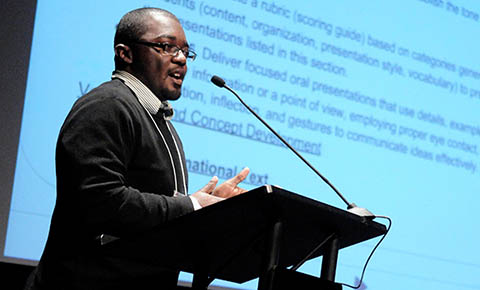Spikes Receives Fellowship to Study News Literacy

Learning sciences doctoral student Michael Spikes received a Northwestern University Cognitive Science Advanced Fellowship to study and help others learn how to determine the credibility of a news story.
His interdisciplinary project, "Using Cognitive Apprenticeship as a Model for Improved News Literacy" will research the specific cues that experts in news literacy use to assess whether a news story is reliable.
Spikes will then create a tool to highlight those cues for individual with low news literacy to help them more critically evaluate what they read and hear.
“News literacy is much more than a bunch of heuristic shortcuts or techniques or tips to figure out the credibility of news reports,” Spikes said “It’s a way of thinking, doing and being when you approach all types of information, including news. I wondered, could we catalog those skills and teach it, using a cognitive apprenticeship model?”
Spikes has been teaching, writing about, and developing curriculum on the subject of news literacy and its production for more than 15 years. His work building critical thinking skills around news literacy has become increasingly important, as technology has helped fuel the spread of unfiltered information.
Before coming to Northwestern, he worked in news media and information literacy with the Center for News Literacy at the State University of New York at Stony Brook, Chicago-area school districts, libraries around the US, and colleges and universities around the globe to develop, train, and produce curricular tools and facilitate research.
He also was the primary architect of Chicago-Area Teacher Training Programs for the Center for News Literacy during its work with the Illinois Civic Mission Coalition.
His current project, which brings together the fields of learning sciences, cognitive science and communication studies, is co-sponsored by David Rapp, professor of learning sciences in the School of Education and Social Policy, and Nathan Walter, assistant professor in the School of Communication.
“Mike’s proposal seeks to understand news literacy with the goal of supporting critical, evaluative interactions with the news,” Rapp said. “His in-depth understandings of news creation and consumption will connect learning science examinations of literacy experiences with design-based considerations for developing instructional approaches. Mike is incredibly well-positioned to tackle these timely issues.”
Spikes, also a television, radio, and podcast producer, was working on a leadership podcast for Kellogg School of Management in 2017 when he participated in an interview with Rapp for an episode called “Why Do So Many People Distrust the News?”
Intrigued by Rapp’s research, Spikes followed up with the SESP professor and enrolled in the learning sciences doctoral program to more deeply pursue one of his passions – improving news media literacy.
“The news should help people become more cognizant and knowledgeable about the world,” Spikes said. “Certain media outlets that are labeled as ‘news’ aren’t helping with that. What worries me is that places where people are getting much of their information isn’t encouraging them to ask themselves the questions of ‘what is known? What isn’t known? What might I be missing?”
On a regular day, Spikes actually tries to limit his news consumption. He listens to the NPROne app, which allows him to skip stories. And the only notifications on his phone come from the Wall Street Journal or the New York Times because, he says, “because we’re in a world of perpetual breaking news.”
In fact, his background in news literacy has given him a different way of approaching it. “I tend to move towards print news, so I can slow down and think about the context of the situation I’m reading about,” he said. “When I find that I’m mostly reading viewpoints that don’t challenge my existing views, I wonder what I might be missing.”
Then he reads the Wall Street Journal, the National Review and other mainstream right-leaning publications. And to get differing opinions in one place, he listens to The Argument, a New York Times podcast featuring op-ed writers from different sides of the political spectrum.
When parents ask for suggestions on how to talk to their kids about the issue of information on social media platforms, Spikes stresses discussing the topic of the point of view of the person delivering information, in the same way elementary school age children are taught to think of how the story of The Three Little Pigs would change if told from the wolf’s point of view.
“Think about the motive the person would have” he said. “It’s also important to note that young people today are not only consumers of info but also producers. If they can think about the motives behind their own creation of content – what they are looking for when they take a selfie or make a video – they can use that same sort of reasoning to assess other information that they’re getting.”
“We’re very quick to get the news that confirms our beliefs and move on,” Spikes added. “The big questions you should be asking are, ‘what are they telling me?’ How do they know? What don’t they know and why don’t they know it?’”
Once he has his doctorate, Spikes hopes to possibly stay in academia and start an institute for research and practice in news literacy education. “I want to find ways to build bridges between research and practice,” he said. “I have always been interested in media that teaches, whether it’s old educational film clips or instructional videos on YouTube, or the news.”